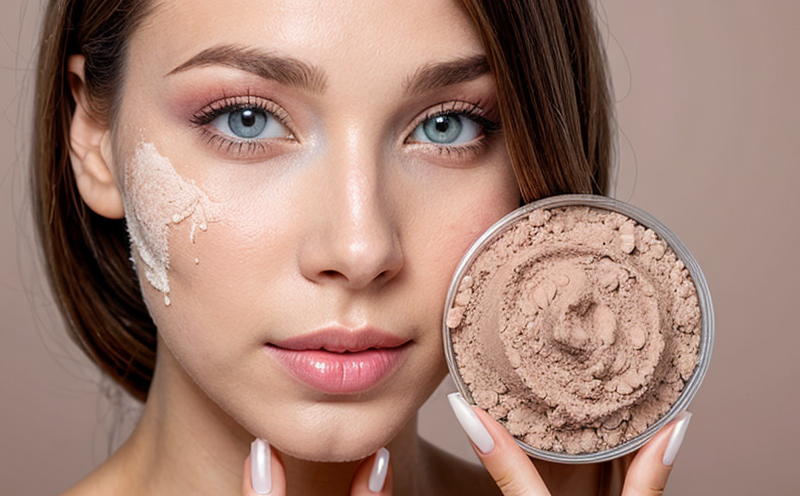Titanium Dioxide Sensitization Testing in Cosmetic Powders
The use of titanium dioxide (TiO2) in cosmetic powders has grown significantly, driven by its broad spectrum of benefits including UV protection, opacity, and color enhancement. However, the introduction of this ingredient into cosmetics also brings challenges regarding potential allergen sensitization issues. Sensitization testing is crucial to ensure that cosmetic formulations are safe for use across a diverse population.
Titanium dioxide sensitization testing involves assessing whether the titanium dioxide in cosmetic powders can trigger an allergic response or sensitization in individuals who come into contact with the product. This testing is particularly important given the prevalence of sensitive skin conditions and the increasing awareness among consumers about potential allergens.
The testing process typically includes several steps: first, the preparation of the cosmetic powder sample to ensure it is representative of the formulation being tested. The sample must then be applied under controlled conditions that mimic real-world usage scenarios. Following exposure, a series of tests are conducted to identify any signs of sensitization or allergic reactions.
Accurate and reliable results from titanium dioxide sensitization testing are essential for regulatory compliance and consumer safety. Compliance with international standards such as ISO 10993-18 is critical, ensuring that the test protocols align with global best practices in cosmetic safety assessment.
The significance of this testing cannot be overstated. It helps manufacturers to identify potential risks early in the development process, allowing for necessary adjustments before products reach the market. This proactive approach not only protects consumers but also enhances brand reputation by demonstrating a commitment to product safety and quality.
- Customer Impact: Reduced risk of product recalls due to allergen-related issues.
- Safety Assurance: Enhanced consumer confidence in the cosmetic products, leading to increased brand loyalty.
- Regulatory Compliance: Ensures adherence to stringent international standards and regulations.
In summary, titanium dioxide sensitization testing is a vital component of cosmetic product development. It plays a crucial role in ensuring that the products are safe for use by individuals with sensitive skin or those who may be prone to allergic reactions.
Why It Matters
Consumer safety and regulatory compliance are paramount in the cosmetics industry, making titanium dioxide sensitization testing essential. Allergens like titanium dioxide can cause severe skin irritations and allergic reactions if not properly managed. The primary concern is that individuals with sensitive skin or those who have a history of allergen sensitization may experience adverse effects from prolonged exposure to cosmetic powders containing titanium dioxide.
The implications for businesses are significant. Non-compliance with safety regulations can lead to product recalls, legal actions, and damage to brand reputation. Consumers expect transparency and assurance that the products they use daily are safe. Therefore, rigorous testing is not just a compliance measure but also a consumer protection initiative.
From an industry perspective, the demand for allergen-free cosmetic powders continues to grow. This trend underscores the importance of titanium dioxide sensitization testing in ensuring product safety and meeting consumer expectations. By conducting thorough tests early in the development process, manufacturers can mitigate risks and enhance the overall quality of their products.
In conclusion, titanium dioxide sensitization testing is a critical step that ensures the safety and compliance of cosmetic powders, ultimately benefiting both consumers and businesses alike.
Scope and Methodology
The scope of titanium dioxide sensitization testing in cosmetic powders involves assessing the potential for allergenic reactions to titanium dioxide. This is typically done using standardized methods that simulate real-world exposure scenarios. The methodology follows international standards such as ISO 10993-18, which provides detailed guidelines on how to conduct these tests.
The first step in the testing process involves preparing the cosmetic powder sample according to specific protocols. This ensures that the sample accurately represents the formulation being tested. Once prepared, the sample is applied to a controlled environment designed to mimic conditions of actual use. This could include applying the powder to skin patches or using it in a spray application.
The exposure period varies depending on the test protocol but generally lasts for a minimum of 24 hours. During this time, closely monitored observations are made to detect any signs of sensitization such as redness, itching, or swelling. If an allergic reaction is observed, further tests may be conducted to confirm the presence of sensitization.
Following the exposure period, samples are analyzed using various techniques including histopathological examination and patch testing. These methods provide detailed insights into the nature and extent of any sensitization reactions. The results are then compiled and reported according to established guidelines to ensure consistency and reliability.
The methodology is designed to be comprehensive yet precise, ensuring that no potential allergens go undetected. This approach not only upholds high standards of safety but also builds trust with consumers by demonstrating a commitment to product integrity.
Customer Impact and Satisfaction
Titanium dioxide sensitization testing in cosmetic powders has direct and positive impacts on customers by ensuring the safety of their products. This testing process helps manufacturers identify potential allergens early, allowing for timely adjustments to formulations if necessary. As a result, consumers can be assured that they are using products that meet stringent safety standards.
The impact extends beyond regulatory compliance; it also contributes to enhanced brand reputation and consumer satisfaction. By prioritizing product safety through rigorous testing, manufacturers earn the trust of their customers, fostering long-term relationships based on reliability and quality.
Moreover, this testing process helps in reducing the risk of product recalls due to allergen-related issues. This not only saves businesses from potential legal actions but also protects consumers from unnecessary exposure to harmful substances.
In summary, titanium dioxide sensitization testing is a crucial step that ensures the safety and compliance of cosmetic powders, ultimately benefiting both customers and businesses by fostering trust and enhancing satisfaction.





